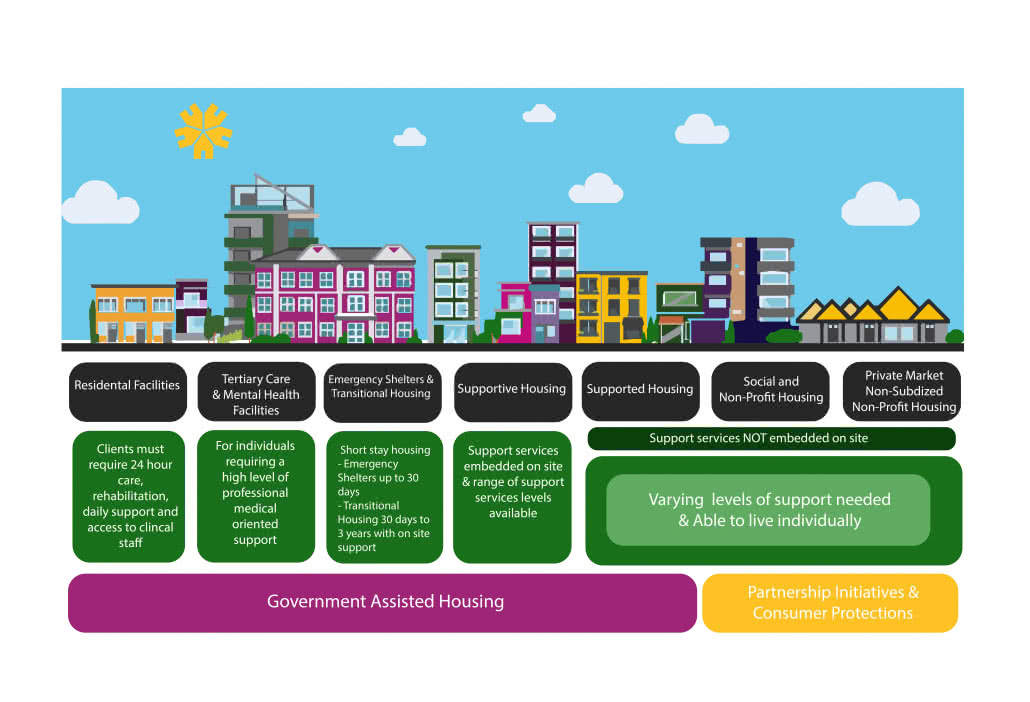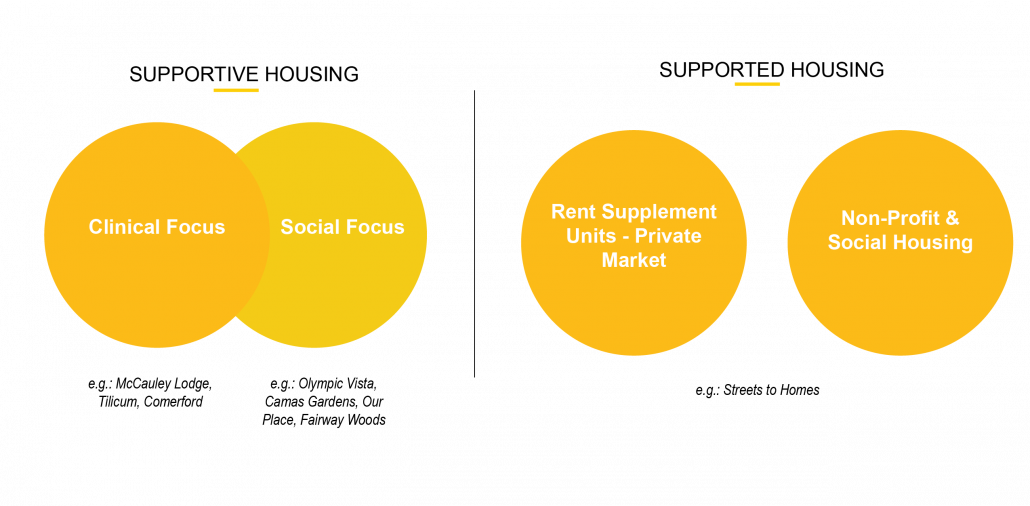The AEHCR Ceased Operations September 30, 2025
Homelessness is not just what is visible on the street. It exists when individuals live in abandoned buildings, sleep under bridges, camp in parks, access emergency shelters, or couch surf.
The Canadian Observatory on Homelessness speaks to this range through the four kinds of homelessness identified in its definition, including people who are unsheltered, emergency sheltered, provisionally accommodated, and insecurely housed.
All of these living situations, from utterly homeless to precariously housed, put people at risk of poor physical, mental and social health.
It is also important to consider the various causes of homelessness, many of which intersect:
Without this broad understanding of the types and causes of homelessness, those caught in the system, particularly those with complex and multiple issues such as mental health diagnoses or addictions can find themselves in a cycle of homelessness → housed → struggling to stay housed → and back on the streets.
Affordable Housing
According to the Canada Mortgage and Housing Company (CMHC) housing is considered to be affordable when a household spends less than 30% of its pre-tax income on adequate shelter. In addition, “the term ‘affordable housing’ can refer to any part of the housing continuum from temporary emergency shelters through transitional housing, supportive housing, subsidized housing, market rental housing or market homeownership.”
Effectively addressing homelessness requires a range of approaches that are tailored to individual need and are provided through a range of programs and services. The Spectrum of Housing, below, illustrates a distinct suite of housing and support service models that can all help individuals experiencing homelessness move toward greater housing stability.
It is important to note that these are not steps or stops along a continuum, but rather a spectrum of options available to those in-need as their circumstances dictate. These circumstances can fluctuate as life changes, which is why having a range of approaches that are integrated into one system is an important aspect of successful intervention.
Housing Programs
The Provincial Homelessness Initiative provides housing with integrated supports to people who are homeless or at risk of homelessness. Some PHI developments provide additional supports for clients with mental health and/or addictions issues. Under this initiative, the Province works in partnership with local communities, the federal government, and non-profit providers to develop new housing options with integrated support services.
The Homeless Prevention Program is aimed at providing people in identified at-risk groups facing homelessness with portable rent supplements to help them access rental housing in the private market. The program assists youth transitioning out of foster care, women who have experienced violence or are at-risk of violence, people leaving the correctional and hospital systems, and individuals of Aboriginal descent. Support services are provided to ensure enhanced access to housing and community-based services. The program operates, in many instances, as an enhancement to the existing provincially-funded Homeless Outreach Program/Aboriginal Homeless Outreach Program.
The Homeless Prevention Fund (HPF)
The Homeless Prevention Fund is an initiative by the AEHCR and ten partners that provides emergency assistance to individuals and families in Greater Victoria who are in financial threat of losing their housing. Grants are used to pay rent, utility bills or damage deposits, and the maximum available amount is $450. With the generosity of private donors, the fund was established at the Victoria Foundation in January 2011. Recipients have to demonstrate that they have exhausted all other means of help and have a plan for paying rent next month. They do not have to repay the money, but can only apply once a year.
For information about donating to the HPF: Donate
Access and Contact Information
To access the HPF or for more information contact one of our HPF partners:
Our Place Society, 250-388-7112
Mustard Seed, 250-953-1575
Victoria Native Friendship Centre, 250-384-3211
Rock Bay Landing (Victoria Cool Aid Society), 250-383-1951
Sandy Merriman House (Victoria Cool Aid Society), 250-480-1408
Burnside Gorge Community Association, 250-388-5251
Together Against Poverty Society, 250-361-3521
Pacifica Housing Society, 250-385-2131
St. Vincent de Paul, 250-382-2709
To ensure the best possible service, please mention you are interested in the Homelessness Prevention Fund when you contact these agencies.
Housing Supports
Housing that is long-term and affordable for individuals experiencing or at imminent risk of homelessness coupled with embedded support services available on-site. The support services are connected to the specific site or unit and are not connected to the individual. The tenant may not necessarily choose to access available support services provided on-site, however. The support services provided through Supportive Housing include all services performed, provided, or arranged by a providing organization or organizations to promote, improve, conserve or restore the mental and/or physical well-being of a participant. Available services can include any combination of clinical and social support programming. In addition, on-site support services can be enhanced through specialized supplementary programming, e.g. Assertive Community Treatment Team, Intensive Case Management Team, etc.
Supported Housing
Housing that is long-term, independent and integrated into community coupled with support services for individuals experiencing or at imminent risk of homelessness. The support services are not embedded in a specific housing unit or project as they are connected to the individual. Supported Housing can comprise any combination of the following depending on the individual/program:
- Affordable Housing – Housing that is affordable to an individual experiencing or at imminent risk of homelessness. Typically this would be affordable at the Government of British Columbia’s Income Assistance Shelter Maximum level.
- Rental Supplement – Income subsidy provided to the client of a community-based support service program to enable them access to a rental unit that would otherwise be unaffordable. These rental units can be either in the private rental market or in non-profit owned and managed rental housing provided there is no provincially funded operating subsidy for the non-profit managed housing unit.
- Support Services – All services performed, provided, or arranged by a providing organization or organizations to promote, improve, conserve or restore the mental and/or physical well-being of a participant. These services can be either provided in the individual’s unit through ‘in-reach’ or in a community setting through referral. Available services can include any combination of clinical and social support programming.


